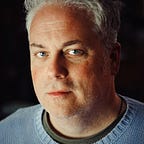The Language(s) of Christmas
An old ornament emerges from a box with a story in many tongues.
First published in my Substack newsletter, Unsorted but Significant, in December 2023.
THERE ARE BOTH BENEFITS AND CHALLENGES to living in the house where you grew up, surrounded by the ballast and possibility of more than a half-century of multigenerational knick-knackery. One evening last week, I came upon a real benefit.
We were carefully arranging our Christmas decorations when, at the bottom of an ornament box, I came upon a relic from my childhood. Turns out it was a relic that, in 10 tiny red and green cardboard panels, helped shape my world view when I saw it hanging at the holidays every year.
My parents were linguists. They believed in the abiding power of communication. People sometimes told them they were naive. I do not for a moment believe they were. Once, in a conversation with me at the edge of a lake in 1996, my father said this (I was taping him):
“Increase in communication inevitably leads to finer perceptions of what’s right and what’s wrong — at least, finer perceptions of people’s goals and how valuable they are. And I think that the tolerance that you acquire from this various kinds of experience, if passed on, and if it ever becomes universal, and if war and other discrepancies with goodness and godliness, if wars and things like these can be ever eliminated, it will be through greater understanding.”
“Therefore, the ultimate thing that people work for in my particular area, and in your mother’s particular area, is world peace: One tiny step for man, one tiny step toward peace.”
Which brings us to what emerged from the box last week.
PHYSICALLY, IT WASN’T, ISN’T, MUCH: 10 panels, each with “Merry Christmas” rendered in a different (European) language. There were German (“Fröliche Weihnachten”), Spanish (“Felices Pascuas”) and French (“Joyeux Noël”). There was Danish (“Glædelig Jul”). There were Dutch and Polish (“Gelukkig Kerstfeest,” “Wesolych Swiat”). There was Gaelic (“Nodlaig Sona Duit”). Each panel was, is, held together by a fabric strip to form a vertical cascade of Christmas wishes.
As a child, I remember being transfixed by this physically unremarkable thing. Yes, on one level it was about different languages — totally on brand for my parents and their profession. And that was interesting. But what came rushing back to me last night was what I remember thinking back then, too, which was kind of awesome: the notion that around the world (or, in this case, at least Europe), people with very different traditions and backgrounds approached this time of year with meaning and intention. And while they may have been very disparate households, there were people in other places who, at this time of year, felt the same way that I did right here in a midcentury modern house north of Pittsburgh.
That was powerful, and it contributed (deliberately on my parents’ part, I’m sure) to my growing sense of being a citizen of the world — something that served me well during the years that then still lay ahead of me, when I would have to find my way while living chunks of my life in Singapore, China, Thailand.
And while not everyone celebrates Christmas, this little collection of holiday wishes pushed me a little further down the road toward one of my favorite lines from literature, uttered by Tom Joad in “The Grapes of Wrath”: “Maybe it’s like Casy says. A fellow ain’t got a soul of his own, just a little piece of a big soul, the one big soul that belongs to everybody.”
We are connected. And even a mostly forgotten Christmas ornament — sitting dormant in deep time in the same house for a half century and brought out for only a couple of weeks each year — can reveal that truth. So Glædelig Jul to you and you and you, wherever you are.
Related stories:
Ted Anthony, a journalist based in Pittsburgh and New York, has reported from more than 25 countries. He is the author of Chasing the Rising Sun: The Journey of an American Song. He tweets here, Instagrams here and collects his writing here.
© 2023 Ted Anthony
